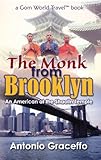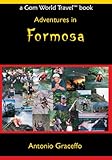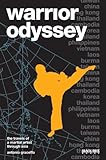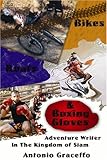Antonio is an applied linguist, and martial arts and adventure author living in Asia (check out our interview with him here). His books, including ”The Monk from Brooklyn”, are available at Amazon.com .
.

When I started my Vietnamese intensive course, a lot of non-linguistists I talked to said that the Chinese students would have an advantage because they already speak a tonal language.
It is true that some Westerners could be completely stumped by tones, and just not get the language at all. But, a person who already speaks a tonal language does not have an advantage over a Westerner or a Korean or Japanese who is intelligent, motivated and who is trying to learn tones. Remember that a Cantonese or Mandarin speaker has mastered the tones of his or herlanguage, not the tones of Vietnamese. Saying that someone from a tonal language would have an advantage is like saying people from languages with words, or sounds, or verbs or adjectives would have an advantage.
Mastery of a particular language is based EXCLUSIVELY on your mastery of THAT language, not other languages. If you know tones in one language, you still need to learn the specific tones for the new language you are studying.
Next, people who were more language-savvy suggested that both the Chinese and Korean students would have a huge advantage because of all of the Chinese cognates between Chinese, Korean and Vietnamese. But in my class, I have noticed the Chinese and Koreans don’t even hear or notice the cognates. I help Schwe Son translate his homework every single day and he never sees the cognates. The Koreans are the same.
In addition to not having a particular advantage, our Chinese classmate, Schwe Son (not his real name) seems to have a number of special problems because of his Chinese mother tongue. For example, we learned the words for “half a million.” But in Chinese, there is no word for a million. They count by ten-thousands. So, a million is 100-ten-thousands. Schwe Son pointed at the Vietnamese words for half a million, nửa triệu, and asked me to translate. I translated it into Chinese, literally, “Half of 100-ten-thousands.” The look on Schwe Son’s face was as if he had just seen me defecate in a frying pan. “Why don’t they just say 50-ten-thousands?” He asked. He had a point.
The old Vietnamese word for Burma is ‘Miến Điện’ the same as in Chinese. But now the Vietnamese have created a Vietnamese spelling for the countries new name of Myanmar. Most languages and most countries move toward not changing country or city names, but just spelling them in their own language. This is why Beijing is now Beijing in English, instead of Peking. But Chinese cannot move in that direction, as it is impossible to spell foreign words with Chinese characters. As a result, many Chinese place names are outdated. Or, they have to create a totally new word, which may or may not be recognizable as the place it relates to.
So, in class, when we encounter country names that are instantly recognizable for Western or Korean students, but for which Schwe Son needs a translation. Afterwards, the translation has no real meaning for him. He just has to memorize it, although it doesn’t relate to anything.
We have only had eight days of class so far, but have already encountered a lot of Chinese cognates. The word for ‘a shop’ which I learned in Hanoi was ‘cửa hàng’. But here in Saigon they say ‘tiệm.’ this is a cognate from the Chinese, ‘Diàn’. And yet, when we came to this word, Schwe Son asked me to translate. I said, in Chinese, “tiệm means Diàn.” Schwe Son simply said, “OK.” And immediately wrote the Chinese character in his notebook. There was not even a flicker of recognition.
Here is a list of Chinese cognates from the first eight days of class (I have only listed modern Mandarim cognates. If I were to list ancient Chinese cognates (similar to Korean and Cantonese cognates) the list would be much, much longer.)
| English | Vietnamese | Chinese Pronunciation | Chinese Character |
| Please | xin | Qǐng | 請 |
| Shop (n) | tiệm | Diàn | 店 |
| South | nam | Nán | 南 |
| East | đông | Dōng | 東 |
| come | đi lại | Lái | 來 |
| Zero/Empty | Không (zero) | Kōng (empty) | 空 |
| zero | linh | Líng | 零 |
| prepare | Zhǔnbèi | chuẩn bị | 準備 |
| money | tiền | Qián | 錢 |
| side | bên | biān | 邊 |
| Café | quán cà phê | Kāfēi guǎn | 咖啡館 |
| wrap | bao | Bāo | 包 |
| pronunciation | phát âm | Fāyīn | 發音 |
| dictionary | tự điển | Zìdiǎn | 字典 |
| Burma | Miến Điện | Miǎndiàn | 緬甸 |
| Country | Quốc gia | Guójiā | 國家 |
| Germany | Đức | Déguó | 德國 |
Vietnamese is a Mon-Khmer language, in spite of having so many Chinese cognates. Chinese is a single syllable language, with a lot of compound words. But Mon Khmer languages have multi-sylabic words. The Chinese student is having a lot of difficulty with the pronunciation of multi-sylabic words.
Possession in Khmer, Vietnamese, and English can me made, using the verb, “to belong to”, as in, ‘the book belongs to me.’ But most languages don’t have that construction. Neither Korean nor Chinese has it. (It exists in Korean, but no one uses it). So, they were all having a hard time understanding the concept of, “book belongs to me”, “sách của tôi”. The Chinese student kept pushing me for word-for-word translations. But obviously, there was no way to translate this word-for-word. I could only translate the meaning. In Chinese, “This is my book.” But then he would flip the book to the previous day’s lesson. “I thought this phrase meant ‘this book is mine’.” He said. “Yes,” I said. “The meaning is the same, but the wording is different.” “OK, so what is it in Chinese?” he asked again.
Schwe Son realizes he needs to improve his English in order to get through his study of Vietnamese language. So, every day, in addition to translating his homework into Chinese, he asks me to translate it into English for him. And this creates a whole other set of problems.
In Vietnamese there is a word for the noun, “a question” (câu hỏi), and the verb “to ask” (hỏi) is a related word. The noun, “answer” (câu trả lời) is also related to the verb “to answer” (trả lời). But in English, obviously, the verb “to ask” is unrelated to the noun “a question.”
“Open and close your book” in Vietnamese is exactly as it is in English. Meaning the same words “open and close” could be used for the door or a drawer or a crematorium. But in Chinese, the words for “open and close your book” are unrelated to “open and close the door.” I translated for him, and he understood what the phrase ‘open your book meant’ in Chinese, but it was a completely unrelated phrase, that had no meaning and no connection to anything else for him. For the rest of the classmates, once they learned ‘open and close’ they could apply it to anything. But for Schwe Son it was one isolated piece of linguistic noise.
There are so many aspects to learning a language: vocabulary, grammar, pronunciation, usage, and many more. Though an argument could be made that a student with a given native tongue may have an advantage in one area, he or she may have other areas with particular difficulties.
]]> YellowBridge (黃橋 HuángQiáo) is one of the best online Chinese dictionaries available today. When I studying on or near my computer, it is the first place I go if confronted by new Chinese vocabulary or characters. (If you are studying on the go, however, check out my article on the best Chinese dictionary apps for Android and iOS4)
YellowBridge (黃橋 HuángQiáo) is one of the best online Chinese dictionaries available today. When I studying on or near my computer, it is the first place I go if confronted by new Chinese vocabulary or characters. (If you are studying on the go, however, check out my article on the best Chinese dictionary apps for Android and iOS4)
Here’s a rundown of the good and the bad of YellowBridge:
The Good
- It’s free! For being so feature-rich, we are lucky to have access to Yellow-Bridge for a grand total of zero dollars.
- Audio recordings: This wonderfully useful feature used to be available only to paid members, but is now free to everyone. Hurray! Just click the speech bubble below each term to hear it pronounced.
- Presentation of both Simplified & Traditional Chinese Characters: This is a Godsend. While most Chinese learners end up learning “Simplified Characters” (简体字 JiǎnTǐ Zì) since they are what’s used in Mainland China, I highly recommend that you also learn “Traditional Characters” (繁體字 FánTǐ Zì). Not only the traditional forms still used in Taiwan, Hong Kong, and many Chinese communities across the globe, but they give you direct access to ancient Chinese culture. And if you are going to learn both, it is far easier to go “downhill”, that is, starting with the traditional forms and then moving onto their simplified counterparts.
- Multiple search options: You can search from Chinese to English, English to Chinese, and even Pinyin to Chinese.
- Break down of character radicals and components: This is a linguists dream. YellowBridge includes links to the etymological origins of each semantic or phonetic chunk. Be careful though; it is easy to get lost in the details and forget what you originally went there to look up!
- Animated stroke order: This is an amazingly powerful tool that used to available on only the most expensive electronic dictionaries. Now it’s free online. If only I had started learning Chinese characters ten years later…
The Bad
There are few things to complain about with YellowBridge. There are, however, a few things missing that I hope they eventually add to the mix:
- Example sentences: It’s always helpful to see how a given word is used in a sentence, especially when looking up less common words, or terms with multiple meanings.
- Ability to translate entire phrases: As it stands, YellowBridge, like most dictionaries, only translates words and cannot parse complete phrases or sentences as Google Translate does. It would be great if they could someday add this feature, lest otherwise faithful users jump ship and swim toward Googler shores…
- A mobile app: I usually need dictionaries most when I’m out on the go and see something on a sign, in a food menu, or struggle to communicate a particular word with the person across the table at a coffee shop. While you can of course access the dictionary via your mobile device’s web browser, it would make life much easier if they developed a mobile version for iPod Touch/iPhone, Android, etc.
Antonio Graceffo is a martial arts and adventure author living in Asia (check out our interview with him here).
His books, including The Monk from Brooklyn, are available at Amazon.com
 Vietnamese is one of only two major Mon-Khmer languages, the other being Khmer, the national language of Cambodia. Like Cambodia, Vietnam is a former French colony. And so, the Vietnamese language has acquired some loan words from French. I am not yet an expert on the Vietnamese language, but so far it appears that the bulk of the loan words are for concepts which the French introduced to Vietnam, such as: Nô-en (Noel), phó mát (cheese), and ca vát (neck tie).
Vietnamese is one of only two major Mon-Khmer languages, the other being Khmer, the national language of Cambodia. Like Cambodia, Vietnam is a former French colony. And so, the Vietnamese language has acquired some loan words from French. I am not yet an expert on the Vietnamese language, but so far it appears that the bulk of the loan words are for concepts which the French introduced to Vietnam, such as: Nô-en (Noel), phó mát (cheese), and ca vát (neck tie).
Because of Vietnam’s close proximity to China, and a long and turbulent shared history, there is a significant Chinese influence on the Vietnamese language. Sixty percent or more of the vocabulary is Chinese. Chinese words are often easy to spot because they are one syllable words. Khmer words are normally multi-syllabic. Some Chinese words will consist of more than one Chinese character, put together, but these are compound words, and even in Vietnamese, these words would normally be written as two one-syllable words, with space between them.
Even the country name for Viet Nam is taken from Chinese, with Nam, Vietnamese for south, coming from the Chinese word for south, 南 (nán).
It is very telling to see which words in Vietnamese were borrowed from Chinese. For example, words related to education and school subjects are Chinese. History – lịch sử in Vietnamese, 歷史 (lì shǐ) in Chinese. So, the word for history is clearly a loan word, from Chinese, and the pronunciation is fairly similar. Intelligent, thông minh in Vietnamese, 聰明 (cōng míng) in Chinese. Again, it is nearly the same.
Some compound words and loan words are extremely interesting, because they combine Khmer and Chinese or Khmer and French. For example, the Vietnamese word for glove can be bao tay or găng tay. The word “tay” is the Khmer word for hand. In the first example, bao is the Chinese word for wrap, package, or cover. So, the literal meaning is a covering for your hand. In the second example, “tay” is still hand but găng is most likely the Vietnamese pronunciation for the French word for glove (gant).
Dictionary in Vietnamese is từ điển, in Chinese it is 詞典 (cí diǎn). The second syllable of both of these words is nearly identical. The first syllable is pronounced differently, but clearly comes from the same Chinese root.
Study in Vietnamese is học, and university is đại học. If the Vietnamese use Chinese characters to write the title of a university they use the same traditional characters as Taiwan or Hong Kong. Study would be written 學 And university would be written 大 學. But the interesting thing is the pronunciation. In Chinese, study is pronounced xué and university is dà xué (literally meaning “big study”). But the Vietnamese đại học, although using the same Chinese characters, would have a pronunciation much closer to Korean (대학 dae hak) than to modern Mandarin. This is most likely because the loan words in Vietnamese and Korean came centuries past, before the Mandarin dialect became standard Chinese. Another similar example is “dormitory”: ky tuc xa in Vietnamese, and 기숙사 (gi suk sa) in Korean. The Korean and Vietnamese pronunciations are quite similar. They would both use the same set of three Chinese characters, but the pronunciation would be completely different from modern spoken Mandarin, 宿舍 (sù shè).
Another example of a connection between Korean (or older Chinese) with Vietnamese would be the word for happy, hạnh phúc, as in, “I’ll be happy if someone gives me a crossbow.” The modern Chinese word for “happy” is 高興 (gāo xìng). So, it isn’t even close, but the modern Korean word 행 복 (hang bok), is almost the same.
Sometimes all three languages align. The Vietnamese word for “romantic” (lãng mạng) is almost identical to both the Chinese 浪漫 (làng màn) and the Korean 낭 만 (lang man).
Telephone, điện thoại in Vietnamese, is 電話 (diàn huà) in Chinese. In both languages the word điện means electricity. So, this character 電 (điện) appears in nearly all appliance names, in both languages. The Vietnamese word for machine is máy móc and everything from an airplane, máy bay, to a motorcycle, xe máy, includes this machine word. In Chinese, however a computer is seen as an electric appliance, 電腦 (diàn nǎo, literally “electric brain”) whereas in Vietnamese, the computer is a machine, máy tính.
While the word for motorcycle and airplane use the Vietnamese word for machine, the word for car is clearly a loan word from French, ô tô.
The Chinese word for machine is 機器 (jī qì). So, it is not similar in pronunciation to the Vietnamese word, máy. But the function is the same. Airplane, máy bay in Vietnamese is 飛機 (fēi jī) in Chinese. Both Chinese and Vietnamese create the word airplane as a compound word, composed of two syllables, written separately, one of which means “machine”. Camera is máy ảnh in Vietnamese, 照相機 (zhào xiàng jī) in Chinese. Again, the overall word for camera is different, but both Vietnamese and Chinese have created a compound word for camera which contains the respective word for machine plus the respective word for picture or photo.
Many language learners put great emphasis on words. They want to learn vocabulary, thinking that learning a language and memorizing lists of definitions is somehow the same thing. Obviously, they are nearly completely separate from each other. If you were a native speaker of French, Chinese, and Khmer learning Vietnamese, you would still need to acquire, grammar, usage, and pronunciation, as well as cultural-linguistic elements, such as forms of address and appropriateness of speech. So, even a triple native speaker would be a long way off.
Studying the mechanical parts, the elements, the words of a language is, however, an interesting academic pursuit. In the case of the Vietnamese language, it is fascinating to see how so many components of the language can be traced to some other language, and yet Vietnamese is completely unique.
____
Like Antonio’s writing?
Check out some of his fantastic books on travel, martial arts, language learning and endangered cultures.
]]> Dr. Orlando Kelm holds a Ph.D. in Hispanic Linguistics from the University of California at Berkeley. He is a Spanish and Portuguese professor at the University of Texas, and Associate Director of the Center for International Business Education and Research.
Dr. Orlando Kelm holds a Ph.D. in Hispanic Linguistics from the University of California at Berkeley. He is a Spanish and Portuguese professor at the University of Texas, and Associate Director of the Center for International Business Education and Research.
In our interview, Orlando shares what he believes to be the 6 most important factors in effective language learning.
Listen
Click the red button below to listen:
___
Read
Orlando: Well let me start by saying that I like your Foreign Language Mastery blog site; it’s been fun to read.
John: Thank you. I’ve ended up interviewing a number of my mentors and heroes, and I stumbled across your blog and really liked what you had to say, so I thought it would be good to share your views with my listeners and readers. So I think best would be maybe to go through those 5 fundamentals that you have on your blog. [Note: In my preparation for the interview, I accidentally missed reading No. 6.]
Orlando: Ah, sure.
John: I think that really sums up your basic stance. I’m sure there’s a lot more you could say, and we’ll fill in as we go. I think the first one was the 500 hours of study that’s required to reach a modicum of fluency.
Orlando: Right. The issue is time on task; that people underestimate how long it takes to learn a foreign language. And sometimes, even if they’re doing everything right, there’s a sense that “Oh, I still don’t speak Spanish!” because you don’t speak it as well as you speak English. And it’s always good to go back and tell people, “Even if you’re doing everything right, it’s not going to be a 20-hour project.” You know, I always get phone calls from people saying, “Uh, we want to negotiate with people in Mexico. Can you teach us some Spanish?” And it’s like, “Sure, but it’s not going to be a during your lunch hour for 3 weeks type of project.” So that first category is that realize that it does take time on task, and to be proficient in a foreign language, is going to take you a hunk of time.
That 500 hours is a nice number, too, because what it says is that even if you’re in a normal classroom situation and you meet 5 times a week for a whole semester, you’re still going to be way short of 500 hours. So a lot of it is you just got to spend more time on task. That’s number 1.
John: Ok, and then number 2 was about context.
Orlando: Number 2 is context, which is, words stick when you’re in the situation of the moment. Word’s don’t stick if you can’t connect them to some sort of experience or some kind of context. I often give the example to my students of a time I was sitting on a bus in Brazil, and there was this kid that was driving me crazy, jumping up and down and screaming and yelling. And the mother yelled out, “Não faça isso, filho.” (Don’t do that, son.) And I remember thinking afterwards, “Wow, command form!” And never again did I have to think about how to conjugate a command form in Portuguese. I saw the lady; I saw the kid; he was driving me crazy; and forever more, I could just say “Não faça isso, filho.” So that context of the moment really helped me have that word stick. So I think it’s a big deal to put all of your language learning into some sort of real context of a real opportunity.
John: Ok, on that note, what advice do you have for somebody who, for example, lives in the United States, and doesn’t have the opportunity to go live abroad? What can they do to create a context for themselves, so that that sticks?
Orlando: Well, you know what, the nice thing of being an adult learner is you can pretend. You can create those scenarios for yourself. You can put yourself in the situations. You can visualize yourself actually buying something, saying something. I actually think that’s one of the great opportunities of an adult learner; is we can role-play stuff. Where children when they learn a foreign language, they can never really put themselves in a role-play situation. But you see the sad thing is that a lot of people don’t know that. And so they will just take a big gigantic list of words, and kind of keep reading the list of words, and never ever try to visualize, “How are you ever going to really say this?” or “What would you really say in this real situation?”
John: You mentioned about differences between children and adults. Maybe we can go off on that tangent shortly. I think there are many, but I also think that there is a lot in common that people also underestimate. What’s your view on the similarities and differences?
Orlando: You know, I’m not a gigantic fan of the whole critical period, you’re kind of doomed after you’re an adult kind of thing. I also don’t believe, that, you know, sometimes people talk about how easy it is for children to learn a foreign language. But if you look at the amount of energy and effort they really put into it, we’re talking about 5, 6, 7 years where their whole concentration is language, language, language, playing with languages, playing with sounds, trying phrases out, communicating back and forth. There is nothing easy about the way children learn foreign languages. They’re just putting tons and tons and tons of effort and time into it. And so I think that sometimes we sell ourselves short when we say, “Oh, there’s automatic language learning that goes on when you’re a child.” Well, it’s automatic in the sense that you’re doing it every day, every day, every day, every day. But it certainly isn’t without tons of effort. And if we put as much effort into our adult language learning, as what children do into their first language acquisition, we would probably do a lot better as well.
Years and years ago, Lily Wong Fillmore did a great study, it was her dissertation, on little kids that were learning foreign languages in elementary schools. And she had a great example that kids first socialize, then they communicate, then they worry about form. And when we teach foreign languages, we do the exact opposite. We worry about form first; we worry about communication second; and we get to socialization third. And I thought it was kind of a neat observation, that that’s how kids worry about it. If they want to go play in the park, they play in the park. And that’s kind of their number 1 thing to do. And communication becomes second; form is down the road.
John: Interesting. Well, back to number 3, about schema theory and social scripts.
Orlando: Right. You know, I’m a gigantic believer in the idea of chunks, that we learn foreign languages in little chunks, little phrases, little situations. And we know how the script goes. Recently, I was…the example I often give is that when I go to a bakery in a foreign country, that in the Unites States, I know the rhythm of going to a bakery. They ask what you want; they cut it open; they slice it. There’s kind of a way that you follow the pattern of buying meat, and cheese, and bread at a bakery. When you’re in a foreign language, that pattern changes. And it’s not a language issue necessarily; it’s that I don’t know the rhythm of how to keep the flow of everybody’s activities going in the bakery. So in foreign language, if you know the flow of the dialogue you’re supposed to follow, it helps you understand things.
I was recently in Rio, and when I was in the check-out line, somebody asked in essence if I had a “blah blah blah card”. Well of course I didn’t because I was a tourist. And that was not part of my dialogue. I was not ready for the lady at the checkout to ask me about if I had that card. And I went from understanding 100% of what she was saying to a bunch of garbled noise. Because I didn’t know the dialogue. And I had to have her repeat that a couple of times until I finally [realized], “Oh now I know what she’s asking for” and I could say, “No, I don’t have that.” [For] a foreigner that comes to the US, it may be that when you buy a certain thing, sometimes they say, “What’s your zip code?” Well, you’re not ready for them to ask what your zip code is. You’re just trying to buy some bread. And so you would probably not understand that question because you’re not used to that dialogue. So that’s schema theory. Schema theory is: What are the dialogues? What are the chunks? How do we put strings of words together? How do you take turns and change back and forth, and reinforce things? There’s a pattern that we do that in, in language, and the more we understand those patterns, the more we understand the foreign language.
John: That’s also why I think movies are an excellent way, but once you get…
Orlando: Well, we’ll get to that when we get to number 5 on narrow listening.
John: Good point. Ok, so number 4: input and intake.
Orlando: Yah, you see, when the second language theories first were coming out, they talked about the importance of input. And then years later, they said, “You know what? It really… It’s nice to have a lot of input, but sometimes it never sinks in. And so what really is a big deal, is what they call “intake”, which is input that you’re actually conscious of, that you’re aware of, that you’re concentrating on. And you know, the words get changed. Sometimes they call it “consciousness raising”; I’ve even heard it called “input enhancement”. But basically it’s the idea that you have to be exposed to a lot of the foreign language, but it’s not enough to be exposed to it. You have to be actually listening to it; have it sink in. So your input becomes intake. And so I’m a big proponent of that, that you need to hear a lot of language, but you need to recognize it; you need to consciously be thinking of it. And see if it can soak in a little bit while you’re listening.
John: Ok, so number 5 was narrow listening and narrow reading.
Orlando: Yah, this comes from Krashen’s ideas that narrow listening and narrow reading basically means, I believe, that you get more success out of looking at a small chunk in detail than a very large, gigantic hunk, superficially. And so when you look at my materials, the clips will be 2 minutes long. And then I want the students to really study in detail what happens in those two minutes. I seem to get more out of that than I do watching a 2-hour movie. That kind of runs past me. I understand the movie but I can’t say I really learn a lot of foreign language watching that movie. But if I take that same effort and time and put it into a very small chunk of language, and study that in detail, I get a lot more out of it. So I believe that narrow listening and narrow reading does more for language acquisition than a broad, one time through sort of experience.
John: One thing though I have noticed when I look at a short chunk of material, I do agree that I get more out of it in terms of acquisition, but on the other hand, if I do watch a movie or I read a longer passage, I also can get lost in the story, instead of just focusing on, “Oh, I am learning the language”, which I think has its own benefits as well.
Orlando: When I was in China, it was my first time in China and I had a free afternoon, so I went to the movies. And I watched my first movie totally in Mandarin. And it was kind of fun to go through the experience of, “Ok, how much of this am I going to grab?” Because my Chinese is kind of survival level; it’s not fantastic Chinese by any means. But it was pretty fun to go through the whole movie and just see, “Ok, how much am I going to catch onto? No responsibility here; let me just soak in what I can soak in. I think it’s good to be exposed to that now and again, too.
John: Number 6, then? Which I missed I guess…
Orlando: And the final one is, it’s a fairly old model, it’s called Schumann’s acculturation model. And that’s the one where you kind of lump together all the cultural and social factors that affect language learning. You know, as we’re about things like anxiety, motivation, how extroverted you are, how much you identify with the culture yourself. Do you have a girlfriend from that country? Do you love the movies from that country? Do you love the music from that country? That’s a big, big deal. You know, how much you just are the sort of personality that can just jump out and do that kind of stuff versus how much you just hang back.
I remember I had a friend in Brazil who was one of these perfectionists: “Unless I say it correctly, I’m going to say it at all.” And in the end, he never really did learn the language well because he held himself back. He was so guarded about, “Oh, I don’t want to do it wrong. I don’t want to do it wrong.” That sort of personality that can say, “You know what? I want to enjoy this food, and if I don’t say something, I won’t be able to eat it, so let me say something. I think that girl’s pretty. Let me talk to her, because I want to get to know her. I don’t care what it comes out like.”
Well I had a student a few years ago, when I took them to Venezuela, he was a music freak. And he would go out in the street, and as soon as he heard music in somebody’s apartment, he would literally stop, knock on their door, and start talking to total strangers about, “What kind of music are you playing on your radio right now?” His grammar was kind of backwards, but his ability to get to meet people and to talk to people was just phenomenal, just phenomenal. He was amazing.
John: Do you think there’s any harm in speaking too soon?
Orlando: You know, there’s no doubt that people fossilize. You kind of get to a certain level, and then if you can survive for whatever you need your language for, you kind of stop there. And you’ll see that for people who live abroad for 2 years. And after 3 or 4 months, they kind of stop their progress, and kind of never improve after that. But they kind of are able to use the language for whatever they need the language for. Part of the answer to your question is, “What do they really need language for?” And if you’re going just to socialize, just to hang out, you know, just for informal sort of things, maybe your informal Spanish or Portuguese is just fine. It may be that in other situations you need to have more precise, or let’s say “correct”, sort of language forms. I think a lot of it is not just the language learning process; it’s what are you going to end up using the language for.
In terms of speaking too soon, you know, we have the whole silent period concept where it’s good to let it sort of soak in for a while, and then you can start talking. And I think there’s some validity to the idea that you should learn how to be a listener. Too often when we’re abroad, we forget to actually listen to people, and try and soak in. I know that sometimes when I’m abroad, I’ll say to myself, “Ok, for the next hour, I’m just going to sit and listen to people, and make little notes about things I hear. And even in languages I’ve been speaking for 30 years, I’ll still have a notebook full at the end of that hour, just because I want to hear what people are saying. So it’s a give and take. You know, there’s a point where you can fossilize, and if you don’t really, really concentrate, and force yourself to get a little better, you’re just going to get stuck there. And I think it takes a hunk of effort, to, when you feel yourself getting to that point, to actually improve and get a little bit better.
So anyway, those are the six items:
- I think that you have to have a good time on task;
- You need to learn language within the context of the situation;
- I love Schumann’s…I love the schema theory of Vygostky on their scripts and chunks you need to follow;
- I think that input should be more than input; it should be intake, so that it starts to sink in and you concentrate on it;
- I like the narrow listening concept that Krashen has; and
- I think we can’t ignore the big cultural factors that go into language learning.
And that’s all six.
John: Excellent. Very, very good.
Orlando: Well, it was fun talking to you today.
John: It was fun talking to you. I really appreciate your time. Talk to you again.
Orlando: Appreciate it.
____________
For more about Orlando, visit his blog: http://orlandokelm.wordpress.com
And don’t miss his article General principles in learning a foreign language (the basis of the above interview).
______
 With $210,000,000 in sales last year, Rosetta Stone is far and away the best selling language learning product on the market today. But Rosetta Stone’s sales figures say more about the company’s marketing budget than the quality of their products.
With $210,000,000 in sales last year, Rosetta Stone is far and away the best selling language learning product on the market today. But Rosetta Stone’s sales figures say more about the company’s marketing budget than the quality of their products.
A quick look around the web reveals a healthy mix of positive and negative feedback about the product, but there is a big problem with objectivity: the positive reviews tend to be from affiliate sites hoping you click the “Buy” link. Since I don’t sell Rosetta Stone, I figure I can provide an honest, objective review of the product.
Here are my impressions after sampling the free CD-ROM:
The Good
- Attractive & Intuitive: As you would expect from a company as large as Rosetta Stone, they offer a well-designed product with an attractive and intuitive interface. High quality images and sound prompts make the product easy to use.
- No translation: The grammar-translation method favored by many traditional schools and textbooks is not an effective way to learn a language and I was glad to see Rosetta Stone avoid this common pitfall. Users infer the meaning of new words through matching images and sounds in highly contextualized groupings.
- No overt memorization: Although you will “memorize” new words and phrases, Rosetta Stone focuses on sub-conscious internalization of a language, much like the way a child learns their native tongue. Their method mirrors what linguists call “The Natural Approach.”
- Spaced Repetition: As you go through a level, the same words are used multiple times in new sentences in progressively longer intervals. This helps speed up internalization and prolong retention.
The Bad
- Expensive: A complete set for one language (e.g. Rosetta Stone Spanish, including levels 1, 2, 3, 4 and 5) has a list price of $700!!! For that price, you could buy a plane ticket to the country where the language is spoken and get real immersion. Or you could buy premium online subscriptions to dozens of languages instead. (See my recommendations below)
- Repetitive: Although Spaced Repetition is effective, it can make the learning process a little boring. My advice is to supplement formal Spaced Repetition with “Narrow Listening” (i.e. listening to a variety of sources discussing the same topics.) This provides adequate repetition without boring you to tears.
- Requires sitting at a computer: The number one excuse for not studying a foreign language is “I don’t have the time.” My advice to busy people is learning on the go. Using an iPod or portable media player, you can listen to the target language while commuting, waiting in line, doing chores around the house, etc. But since you must be sitting at a computer to use Rosetta Stone, most people will probably not get in the required amount of daily input using their system.
My Verdict
If you have the money and the time, Rosetta Stone is a good choice. Many companies offer their employees subsidies to use Rosetta Stone, and even allow employees to study while at work. Check with your HR or management team to see if they will do the same.
But if you are low on money and time (as most people are), I would instead recommend Praxis Language, the creator of ChinesePod, SpanishPod
, FrenchPod, ItalianPod
and EnglishPod
. The Praxis Pass provides access to premium features for all 5 languages at $39 a month. There is a free 7-day trial to get your linguistic feet wet.
Antonio Graceffo is a martial arts and adventure author living in Asia (check out our interview with him here).
His books, including The Monk from Brooklyn, are available at Amazon.com
 “The rabbit and the lion walked through the jungle. All of the animals ran away. Afterward, the rabbit said to the lion, ‘I told you they were all afraid of me.’”
“The rabbit and the lion walked through the jungle. All of the animals ran away. Afterward, the rabbit said to the lion, ‘I told you they were all afraid of me.’”
This was the story I struggled through last week. Yes, I was sort of proud that it was written in Chinese, but it is quite humbling that most of my reading material is purchased in the books section of Toys R Us. Some of them came with free candy. Others were pop-up books. I particularly like those. All of them are decorated with little cartoon drawing of smiling monkeys and happy flowers.
If your ego gets away from you, as mine often does, just ask the nearest seven year old to help you with your reading practice. This will bring you back to Earth in a hurry.
Learning to read and write Chinese turns you into a study hermit. Chinese children spend five hours a day, from about age five to age fifteen or sixteen, writing endless lists of Chinese characters. In other words, it takes them ten solid years of studying five hours a day, seven days a week, to learn their native tongue.
One reason it takes them so long is because every single piece of vocabulary has to be taught. When you learned to read and write in school, your teachers taught you some very basic vocabulary. Probably through about sixth grade you had spelling tests and vocabulary exercises, but you were only taught a very small percentage of your vocabulary, the rest you acquired passively from listening and from reading and studying your other subjects. But for Chinese, every single piece of vocabulary has to be taught. Even native speakers can’t do much with a word they can say, but don’t know how to read or write.
As an adult foreign-learner you are at a huge disadvantage compared to the native speaker children. For one thing, they already know the meaning of every word.
When you first sign up for Chinese classes, in Taiwan or China, you are given a choice of speaking and listening only, or the complete set of reading, writing, speaking and listening. When I first began learning Chinese at Taipei Language Institute, for the purposes of survival, I chose speaking and listening only. At that time I was the only foreigner on two Chinese Kung Fu teams, training with each team once per day. This gave me several hours of exposure to the language each day outside of the 2-4 hours per day I spent in the classroom. As a dedicated learner, with the opportunity to hear and practice the language, I reached a point where I was getting through a chapter of our book every two and a half days.
One of my American friends, call him Jim, chose the complete set of read, writing, speaking, and listening. In the six months that it took me to complete all of the books from beginner to upper intermediate, he hadn’t completed book one. He could read and write every single word that he knew, but he knew only about 1,000 words when he left Taiwan.
We had another classmate, call her Su Ling, who was a Taiwanese American. At home, her parents only spoke Taiwanese. So, she had returned to Taiwan to study Mandarin for the first time in her life. She could neither read, write, speak, nor understand any Mandarin.
The three of us went to a restaurant, and the waitress automatically handed a menu to Su Ling, and began speaking to her in Mandarin. I interrupted, explaining to the waitress that, in spite of her looks, Su Ling didn’t speak Mandarin. The waitress smiled politely, and resumed her incomprehensible babble with Su Ling.
“Tell her again.” Said Su Ling, “I don’t think she believes you.”
When I finally was able to convince the waitress that I was the one she needed to talk to, she handed me the menu, which I immediately handed to Jim, the only one of us who could read. Jim read the menu aloud, which I understood, but we had to translate into English for Su Ling. When we decided on our order, I told the waitress what we all wanted.
Basically, the point of the story is, if you can’t read Chinese, it takes three people to order off a menu. And, since I often find myself dining alone, I needed to learn to read.
I returned to Taiwan in June 2008, and began taking private lessons in reading and writing in late July. Once I got through my first hundred characters, I realized that learning reading and writing would be a very, very different experience than learning speaking.
When I was learning to speak, I spent as many hours in front of my teachers as possible. The only way I could get any input, any new learning, was sitting with my teachers. But in reading and writing, you have to do it all yourself. The best student will be the one who puts in the most hours of homework. Before, I had the teachers teach me the new material, and I saw them twenty or more hours per week. Now, with reading and writing, I have to teach myself the new material. I work through the chapters completely on my own, and then meet with my teachers just to correct, or go over what I have already done on my own. My ratio now is only six to eight hours per week of lessons and twenty or more hours per week of self-study.
When we were at Taipei Language Institute, I remembered Jim telling me, “With the Chinese, for every single word you learn, you have to learn three things: the way it looks, the way it sounds, and its meaning.”
It’s true. With Chinese, unlike any European language, it is possible to know thousands of words, and not be able to read them or write them. This is where I was when I started studying. The other possibility is that you see a word. You know how to pronounce it, but you forgot what it means. Or, that you remember the meaning, but forgot how to say the word.
One example is that the Chinese have about three ways to express the concept of “a week.” Each of these is composed of two characters. Very often I am reading, and I know the sentence says, “I study Chinese three times per week.” I use the word “xin qi” to express one week, but my teacher corrects me. “These are the characters for ‘li bai’ which also means week.” Two different sets of characters can have the same meaning, but different pronunciations. In English we have a lot of synonyms, which are written and spelled completely differently, but have similar meanings. But, because of our phonetic writing system, it would be impossible to look at the word “demise,” and say “kick-off.”
For myself, the last two don’t happen as often because my vocabulary, going into my basic reading class, was already well over 2,000 words. So, while I could maintain a fairly normal conversation, my reading book has sentences like, “My name is.” and “How many glass of tea did Mr. Wang take?” When any of my Taiwanese friends open my textbooks they always look at me in surprise. “This is so easy. You are way beyond this.” They learned to read so long ago that they forgot that someone who speaks Chinese well may not know how to read at all.
Interesting, my second-grade students don’t think there is anything strange about what I am doing. They watch me do my homework and often say proudly, “Teacher, I can read all of that.” Half way through the page, though, they inevitably stop and ask me, “What is this word?” Yesterday, one of the kids asked me about five different Chinese characters in my homework. I was so proud of myself. If I study really hard, I might qualify for elementary school.
In learning to read, I thought a lot about what Jim said. And, although I understand the concept of why, at universities in the west, students are taught all four skills from day one, this must be a very daunting, very discouraging way to learn. Progress would be so slow. In my case, having learned so many words first, even with reading and writing I am getting through a chapter every three days. This is only possible because I already have the speaking and listening. Maybe this method of study would be better for university students in other countries. Maybe it is only possible if you are studying in a country where the language is widely spoken.
So much about L2 (second language) acquisition has been written based on how children acquire their L1 (first language). There are some fundamental differences, however, namely that an adult has more logic and experience to draw from. An adult also understands the mechanics and use of language. When I teach second graders that they have to use good grammar, they may not even be aware that Chinese has grammar. And certainly, their Chinese grammar wouldn’t be perfect yet.
One point that makes my current study of Chinese reading and writing more similar to the way Taiwanese children learn is that, like a Taiwanese child, my vocabulary is already large and I am already able to speak and communicate. Now, I have to learn the reading and writing. Even in the more advanced reading books, if I get stuck on a word, it is normally because I don’t know how to pronounce or recognize a particular character. But, if my teacher reads the character, I understand. This is exactly the case for Taiwanese children.
There are huge differences in vocabulary and usage, however, but more on this later.
One of my Tainan friends, call him Chuck, has lived in Taiwan for twenty years. He learned all four skills from day one. He had some very interesting points to make about language. First, he said, “I studied hard for the first five years. Then I took the exam and I scored 3,000.” Meaning his test results showed that he knew 3,000 or more characters. Three thousand is the magic number. At that level you should be able to read anything, even college textbooks, but you will still need a dictionary for specialized vocabulary that you may encounter. “I stopped studying at that point,” continued Chuck. “And my Chinese stopped improving. I recently retook the test and still scored 3,000, so I haven’t lost anything. But fifteen more years of living here didn’t cause me to improve.”
Chuck was touching on a subject I have written about extensively, namely, being in the country doesn’t mean you are immersed or that you are learning. Chuck has lots of Taiwanese friends and speaks Chinese all day, but in the course of a normal day or normal conversation, he doesn’t go beyond his three thousand words. The only way to move forward is to study.
Chuck also said, “There is nothing anyone can do for you when you learn to read or write. Even your teachers can’t really help you. If you get stuck or you make a mistake, they can correct you. But you have to learn it on your own.”
And this means countless, lonely hours of reading and writing. Reading and writing Chinese, you become a study hermit.
Chuck told me about a foreigner who was teaching in Taiwan in the 1980s when the country was a bit less developed and regulations were in some ways looser. This foreign adult wanted to learn Chinese, so he went to an elementary school principle and obtained permission to attend classes, along with the children.
“For four years he sat in the back of the classroom learning the stuff children learn,” said Chuck. “But to me, it seemed a little pointless. He didn’t need to know the name of every utensil in the house.”
Now we are back to the differences in vocabulary and approach of an adult learner, verses a child. I haven’t tried it, but I would bet money that if I took my basic reading dialogue entitled “At the Money Changers” and showed it to my second graders, they wouldn’t be able to read any of it. And if I read it aloud, the probably wouldn’t know words like currency exchange, travelers checks, or the technical names for currencies such as American Dollars or New Taiwan Dollars. They might not even be able to read the rates, which are posted in decimal form. At the same time, I don’t know how to say baby bottle or game consul. And I always forget what to call your father’s younger brother.
And perhaps most embarrassing, the second graders didn’t stutter when they were reading the story about the lion and the rabbit. It took me two days to read that.
This hits on my other writing focus. There is a myth that children learn language faster than adults. It’s just not true. For my work as an adventure writer, I need a lot of specialized vocabulary in the fields of international relations, politics, and geography. There is no way second graders would understand any of the concepts, so how would they learn and use that vocabulary. Often, we are talking about a second grader’s inability to learn these words and concepts in a foreign language. But now, I am comparing me, and adult learner, learning Chinese, to native speaker second graders. While they have many advantages in general reading and writing, by virtue of being native speakers, it will be years before they could read and explain the texts I will be using at university, a few months from now. And of course, if we compare an adult foreign leaner to a child foreign learner, the difference becomes even more extreme.
Learning to read Chinese means memorizing one or more characters for every single piece of vocabulary in your head. The characters are based on over a hundred base characters. So, after a while, you can see a new character and guess that it has something to do with talking or driving or is esoterically related to the heart or an open door, but for the most part, it is pure memorization.
The Chinese language is like an epic movie, starring a cast of thousands of characters.
Like Antonio’s writing?
Check out some of his fantastic books on travel, martial arts, language learning and endangered cultures.
]]> Antonio speaks numerous languages (French, German, Italian, Khmer, Mandarin Chinese, Spanish and Thai), and has used his language skills to good ends. He has devoted the past 10 years of his life to chronicling martial arts masters around the world in his web TV show Martial Arts Odyssey and has worked tirelessly to fight the atrocities being waged against ethnic minorities in Burma.
Antonio speaks numerous languages (French, German, Italian, Khmer, Mandarin Chinese, Spanish and Thai), and has used his language skills to good ends. He has devoted the past 10 years of his life to chronicling martial arts masters around the world in his web TV show Martial Arts Odyssey and has worked tirelessly to fight the atrocities being waged against ethnic minorities in Burma.
On top of all this, Antonio has written an impressive trail of books, including The Monk from Brooklyn: An American at the Shaolin Temple, Adventures in Formosa, Rediscovering the Khmers, Boats, Bikes, and Boxing Gloves: Adventure Writer in the Kingdom of Siam, The Desert of Death on Three Wheels, and his latest book, Warrior Odyssey: The Travels of a Martial Artist in Asia.
The Interview:
In this exclusive interview with Antonio Graceffo, he “pulls no punches” (pun intended) when sharing his views on how to learn foreign languages and martial arts effectively. His wisdom stems from years spent living abroad coupled with sound theory.
To learn more about Antonio, visit his site SpeakingAdventure.com.
]]>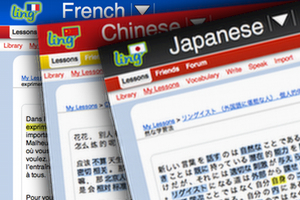 LingQ is an extremely useful and efficient language learning system created by Steve Kaufmann. The site has both free and premium paid content, and currently boasts tools for 10 languages: Chinese, English, French, German, Italian, Japanese, Portuguese, Russian, Spanish, and Swedish (which also happen to be the languages Steve speaks.) Korean is coming soon…
LingQ is an extremely useful and efficient language learning system created by Steve Kaufmann. The site has both free and premium paid content, and currently boasts tools for 10 languages: Chinese, English, French, German, Italian, Japanese, Portuguese, Russian, Spanish, and Swedish (which also happen to be the languages Steve speaks.) Korean is coming soon…
The beauty of LingQ is that when you save vocabulary items using the “LingQ” button, these words will appear highlighted in yellow in all future texts you study. You have the choice of adding your own hint for each word or copying/pasting from the integrated multilingual dictionaries.
There are heaps of lessons covering the entire spectrum of abilities and interests, and you can even import your own audio or text content. For example, I recently imported an e-mail I received in Chinese and then had a Taiwanese friend record the audio. Voila; instant content that is interesting, relevant and perfectly tailored to my learning needs. And of course, vocabulary within your uploaded content can be “LingQed” as discussed above!
Take Action
- Set up a free account at LingQ.
- Choose some lessons in the language or languages you are interested in.
- Read and listen to each lesson multiple times adding LingQs to unfamiliar vocabulary
- Download the audio to your iPod from the site (right click on “download”) or via podcast (you can subscribe to the various LingQ podcasts in iTunes here.)
- Upload your own materials and add LingQs.
- Sign up for a tutor once you are ready to begin speaking.
